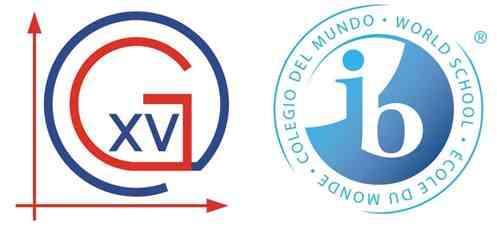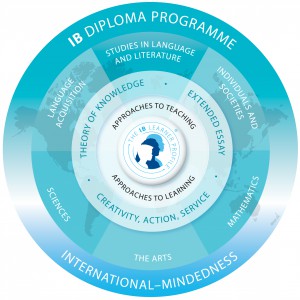General information
IB Diploma Programme – General information
The IB Diploma Programme is designed as an academically challenging and balanced programme of education with final examinations that prepares students, normally aged 16 to 19, for success at university and life beyond. The programme is normally taught over two years and has gained recognition and respect from the world’s leading universities.
The curriculum
IB Diploma Programme students study six courses at higher level or standard level. Students must choose one subject from each of groups 1 to 5, thus ensuring breadth of experience in languages, social studies, the experimental sciences and mathematics. The sixth subject may be an arts subject chosen from group 6, or the student may choose another subject from groups 1 to 5.
In addition the programme has three core requirements that are included to broaden the educational experience and challenge students to apply their knowledge and understanding.
The extended essay is a requirement for students to engage in independent research through an in-depth study of a question relating to one of the subjects they are studying.
Theory of knowledge is a course designed to encourage each student to reflect on the nature of knowledge by critically examining different ways of knowing (perception, emotion, language and reason) and different kinds of knowledge (scientific, artistic, mathematical and historical).
Creativity, action, service requires that students actively learn from the experience of doing real tasks beyond the classroom. Students can combine all three components or do activities related to each one of them separately.
The curriculum is modelled by a hexagon with six academic areas surrounding the three core requirements.
Over the course of the two-year programme, students:
- study six subjects chosen from the six subject groups
- complete an extended essay
- follow a theory of knowledge course (TOK)
- participate in creativity, action, service (CAS).
Normally:
- three of the six subjects are studied at higher level (courses representing 240 teaching hours)
- the remaining three subjects are studied at standard level (courses representing 150 teaching hours).
Subjects, other than languages, are taught and examined in English
IB subjects offered in XV. gimnazija
Group 1: Language A Literature (first language)
Croatian A Literature HL or SL
English A Literature
Group 2: Language B (second language)
English B HL or SL
French B HL or SL
German B HL or SL
Group 3: Individuals and Societies:
Psychology HL or SL
Economics SL only
Group 4: Experimental Sciences:
Biology HL or SL
Chemistry SL only
Computer Science SL only
Physics HL or SL
Group 5: Mathematics HL or SL
Group 6: Electives:
Visual Arts HL or SL
Alternatively, candidates may chose instead of a Group 6 subject a second subject from Groups 2 – 5.
Theory of Knowledge & CAS Activities
Additional compulsory courses:
History and Geography in Croatian for Croatian citizens
Croatian as a foreign language for international students
Additional elective course:
Latin – following Croatian national curriculum
The Higher level (HL) classes will occupy 5 periods per week.
The Standard level (SL) classes will occupy 3 or 4 periods per week.
TOK will be taught 2 periods a week over two years.
CAS activities will occupy one half- day per week.
In addition to completing the six subjects each Diploma candidate must meet the following requirements:
- a) Extended Essay
Complete a substantial piece of independent work, under the supervision of a qualified teacher at the school in one of the subjects of the IB curriculum and submit it as an Extended Essay that meets general and subject-specific criteria.
- b) Theory of Knowledge (TOK)
Follow a course in TOK occupying at least 100 hours throughout the two-year period and complete an essay in the subject.
- c) Creativity, Action and Service (CAS)
Engage in some form of extra-curricular activity approved by IBO. At least the equivalent of one half-day per week is available to all candidates throughout the two-year course.
Assessment
Students take written examinations at the end of the programme, which are marked by external IB examiners. Students also complete assessment tasks in the school, which are either initially marked by teachers and then moderated by external moderators or sent directly to external examiners.
Marking
Performance in each subject is graded on a scale of 1 point (minimum) to 7 points (maximum). For the IB diploma, a maximum of 3 points is awarded for combined performance in theory of knowledge and the extended essay. The maximum total Diploma Programme points score is 45.
The grading scheme in use is as follows:
1: very poor : F : nedovoljan
2: poor : F : nedovoljan HL , dovoljan SL
3: mediocre : D : dovoljan
4: satisfactory : C : dobar
5: good : B : vrlo dobar
6: very good : A : odličan
7: excellent : A+ : odličan
The award of the final grade after IB graduation exams in each subject is the responsibility of the IB Final Award Committee.
Examination session
- At the end of every semester candidates shall take their examinations in all subjects. The minimum of 23 points is required to be promoted to the next grade.
- At the end of Grades 11 and 12, as well as at midterms, school will issue Report Cards for every student.
- In the May of their final year, candidates shall take their IB graduation exams that will be externally assessed.
- A timetable for the administration of examinations, as well as all other regulations, including examination papers, shall be established by the IBO.
- At the end of the Programme, after the graduation, IBO will issue Diplomas for all students who have met the conditions for award of the IB diplomas.
FINAL IB EXAMS (GRADUATION) AND AWARD OF THE IB DIPLOMA
Conditions for award of the IB diploma:
- 1. All assessment components for each of the six subjects and the additional IB diploma requirements must be completed for the award of the IB diploma.
- A candidate will not qualify for the award of the diploma if certain requirements have not been met. (Refer to the General regulations: Diploma Programme .)
Failing conditions :
- CAS requirements have not been met.
- Candidate’s total points are fewer than 24.
- An N has been given for theory of knowledge, extended essay or for a contributing subject.
- A grade E has been awarded for one or both of theory of knowledge and the extended essay.
- There is a grade 1 awarded in a subject/level.
- Grade 2 has been awarded three or more times (HL or SL).
- Grade 3 or below has been awarded four or more times (HL or SL).
- Candidate has gained fewer than 12 points on HL subjects (for candidates who register for four HL subjects, the three highest grades count).
- Candidate has gained fewer than 9 points on SL subjects (candidates who register for two SL subjects must gain at least 5 points at SL).
A maximum of three examination sessions is allowed in which to satisfy the requirements for the award of the IB diploma.
Please acknowledge that even without a negative grade or with 24 points achieved, you may still not receive the IB Diploma due to specific failing conditions.
IB DIPLOMA RECOGNITION
IB Diploma is widely recognized at universities in every country. National requirements regarding the IB Diploma recognition should be checked out with the national Ministry of education and specific universities ( Germany requires that all students should take Math or Science at HL ).
In Croatia IB Diploma is equivalent to Državna matura:
„Kandidati koji su hrvatski državljani i srednje obrazovanje završavaju ili su završili u međunarodnome programu International Baccalaureate (IB) od 2010. godine do danas u Republici Hrvatskoj, mogu se prijaviti na visoka učilišta u Republici Hrvatskoj, pri čemu će se rezultati njihovih završnih ispita priznati kao usporedivi rezultati ispita državne mature, no moraju polagati ispite državne mature koje studijski program zahtijeva, a koje nisu polagali unutar IB mature.“ Iz Brošure: Prijave ispita državne mature i prijave za upis na studijske programe na www.postani student.
More information: www.ibo.org in General regulations Diploma Programme, and Amendments to the General regulations: Diploma Programme





